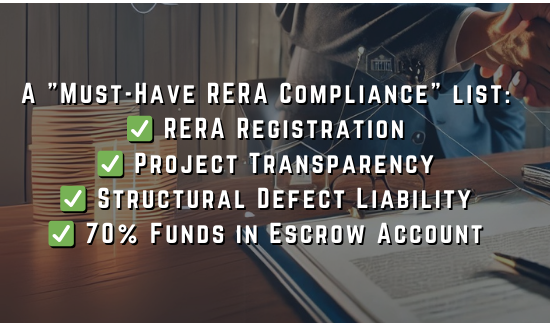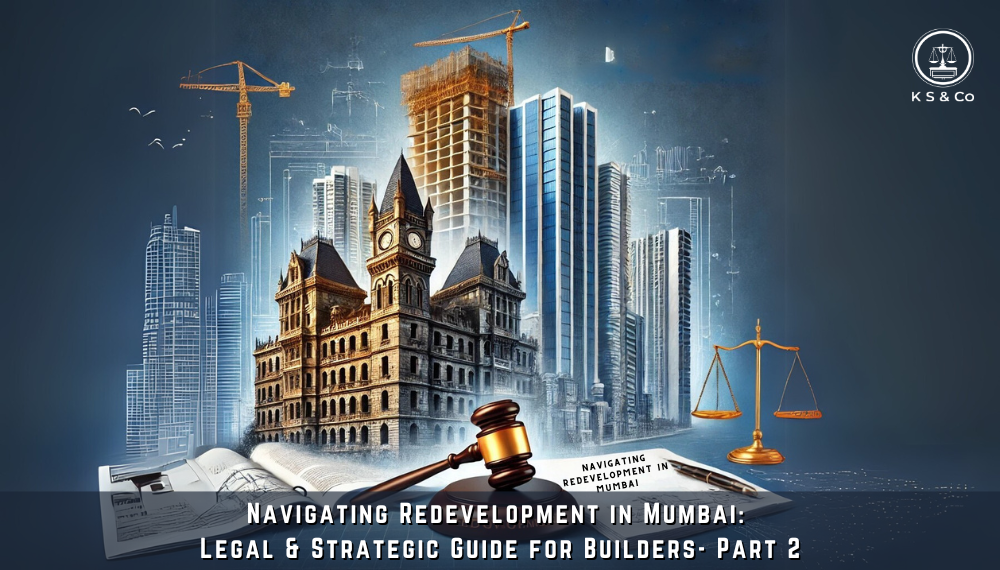Mumbai’s redevelopment wave is reshaping the city’s skyline, replacing aging structures with modern infrastructure. Builders play a pivotal role in this transformation, but the process is layered with legal, regulatory, and procedural complexities.
In this edition, we outline critical legislative updates, step-by-step redevelopment procedures, landmark court rulings, and expert insights to guide builders through the intricacies of redevelopment while ensuring compliance and success.
Key Amendments and Regulations Governing Redevelopment in Maharashtra

1. Amendments to the Maharashtra Housing and Area Development Authority Act, (MHADA) 2022: The required consent threshold for the redevelopment of dangerous buildings has been reduced from 70% to 51%, making the process more streamlined. Additionally, property owners must initiate redevelopment within three months of receiving a notice under Section 354 of the Mumbai Municipal Corporation Act, 1888 (MMC Act), in the event, the redevelopment process is not initiated within 3 months, MHADA Authority will issue another notice to the owners of the buildings allowing them to submit a redevelopment proposal within 6 months from the date of receipt of the notice. The redevelopment proposal shall be accompanied by the consent of 51% of the occupants or tenants in the buildings.
2. Compliance with Development Control and Promotion Regulations (DCR) 2034: Redevelopment projects must strictly adhere to DCR 2034, which governs Floor Space Index (FSI), land use, and zoning regulations to ensure planned and systematic urban development.
Regulation 33(7): For the redevelopment of cessed buildings in the Island City, developers are entitled to an incentive FSI equivalent to 50% of the rehabilitation area. This implies that for every 100 square meters of rehabilitation area constructed, an additional 50 square meters of FSI is granted for free sale.
Additionally, tenant protections ensure that existing occupants receive free housing between 300 to 1,292 sq. ft., with payment required only if they opt for additional space.
3. RERA Compliance Obligations: Developers undertaking redevelopment projects must register them under the Real Estate (Regulation and Development) Act (RERA) to ensure transparency regarding project timelines, plans, and costs. Additionally, as per Section 14(3) of The Real Estate (Regulation and Development) Act, 2016, developers are held accountable for structural defects for a period of five years post-handover of Possession, providing greater security to occupants.
Compliance Under RERA
The Real Estate (Regulation and Development) Act, 2016 (RERA) mandates that all commercial and residential real estate projects must be registered with the RERA authority if the land under development exceeds 500 square meters or if the project involves the construction of more than eight apartments. Promoters are required to submit an application for project registration before launching any real estate development.
RERA registration is merely the initial step in ensuring compliance with various provisions of the Act. Developers are obligated to furnish comprehensive details of the project to the RERA authority and make relevant information publicly accessible, ensuring transparency and adherence to regulatory requirements. The key compliance obligations for developers include:
1. Disclosure of Agreements, Plans, and Approvals
Developers must upload copies of agreements, approved plans, and necessary approvals on the official website of the RERA authority for public access.
2. Quarterly Project Updates
Every registered project must be updated with prescribed details on the RERA authority’s website on a quarterly basis. Non-compliance may result in severe penalties and regulatory action.
3. Maintenance of a Separate Bank Account
As mandated by RERA, developers are required to deposit 70% of all customer receipts into a designated escrow account. These funds must be exclusively utilized for project-related expenses.
4. Adherence to Booking and Allotment Procedures
Developers must comply with prescribed booking and allotment processes, which include:
-
- Conducting transactions through RERA-registered agents.
- Providing buyers with the approved project plan.
- Non-acceptance of advance more than 10% of unit cost
5. Procurement of Necessary Approvals and Insurance
Developers must obtain all requisite approvals and insurance coverage as stipulated by state laws. Given the complexity of RERA regulations concerning insurance, thorough due diligence is required.
6. Formation of an Association of Allottees
As per RERA regulations, every builder or developer shall form the society/association or co-operative society as prescribed by the respective State Government. If nothing is specifically provided by the State Government, then society shall be constituted within 3 months from the month in which the majority of flats are sold.
7. Timely Completion and Handover of Common Areas
Developers must complete the project within the stipulated timeframe and hand over possession of the units within three months. Additionally, all common areas must be transferred to the association of allottees.
8. Structural Quality Assurance
Developers must ensure the structural integrity and quality of construction. Any defects identified within the building must be rectified within 30 days of notification, at no additional cost to the buyer.
 Documents Involved in Redevelopment- Checklist
Documents Involved in Redevelopment- Checklist
- Agreement between Society and Developer: A legal agreement outlining the rights and obligations of both parties, including timelines, financial terms, and responsibilities.
- Development Agreement: This contract specifies the terms of redevelopment, including the allocation of flats, rent compensation, and other benefits.
- Permanent Alternative Accommodation Agreement (PAAA): This agreement is executed by a developer with individual members of housing societies or other occupants whose existing residences are undergoing redevelopment.
- Power of Attorney (PoA): Often, housing societies give developers a Power of Attorney for obtaining approvals from various authorities.
- Consent Letters from Members: Written consent from a majority of members in favor of redevelopment is required.
- Project Plans and Layouts: Approved plans from municipal authorities, including FSI, height, and area restrictions.
- Project Approvals: These include environmental clearances, fire department NOCs, and other statutory approvals.
- Occupation Certificate (OC): Issued by the local authority once the project is complete and safe for habitation.
- Bank Guarantee: In a redevelopment project, a bank guarantee plays a crucial role in safeguarding the interests of the original property owners (or housing society).

Redevelopment of a Cooperative Housing Society (CHS): A step-by-step guide
1.Formation of a Redevelopment Committee:
The CHS elects a dedicated redevelopment committee responsible for assessing the feasibility of redevelopment, engaging with developers, and overseeing the execution of the project.
2. Approval of Redevelopment Resolution:
As per the Clause 12 of Revised Guidelines for Redevelopment of Co-operative Society Buildings in Maharashtra- G.R. dated 4th July, 2019, resolution for redevelopment must be approved by at least 51% of the Total membership strength of the society. This resolution should clearly define compensation terms, rehabilitation provisions, and project timelines.
3. Selection of Developer: 
The CHS usually/ is mandated to invites proposals in form of tenders and evaluates from developers, selecting one based on their experience, financial stability, and proposed terms of redevelopment.
4. Execution of Developer Agreement:
A legally binding agreement is executed between the CHS and the selected developer and members. This agreement, governed by the Maharashtra Ownership Flats Act (MOFA) and the Real Estate (Regulation and Development) Act (RERA), outlines project timelines, financial considerations, and benefits for existing members.
5. Regulatory Approvals:
The developer is responsible for obtaining all necessary regulatory approvals, including:
-
- Obtaining the Intimation of Disapproval (IOD) from the Municipal Authorities, the Developer shall issue a formal notice to the occupants of the existing premises, providing a reasonable period of 45 to 60 days to vacate the premises. This notice is necessitated by the terms and conditions of the IOD, which stipulate that the Developer shall be entitled to apply for and obtain the Commencement Certificate only upon the complete demolition of the existing premises/structures.
- Compliance with environmental and safety regulations.
6. Rehabilitation and Construction:
Residents are temporarily relocated to transit housing while demolition and construction activities commence as per the approved redevelopment plan.
7. Project Completion and Handover:
Upon completion of construction, the developer obtains an Occupation Certificate (OC) and hands over possession of the newly developed units to the rehabilitated members of the CHS.
Challenges faced by Developers in redevelopment project:
- Complex Regulatory Framework
Developers often face significant challenges due to the complex regulatory framework when redeveloping a project. The multitude of policies, guidelines, and development control rules can make ensuring compliance a difficult and time-consuming task. Navigating these legal requirements often results in delays, as developers must obtain multiple approvals and adhere to stringent standards. This not only prolongs the redevelopment timeline but also increases project costs.
- Consent of Society Members

Securing consent from housing society members is a major challenge in redevelopment projects. Gaining unanimous or majority approval is often difficult, and disputes among members over issues like compensation or relocation can cause significant delays or even halt the project altogether.
- Floor Space Index (FSI) Constraints
Developers often face challenges with Floor Space Index (FSI) constraints in redevelopment projects. Rigid FSI regulations limit the potential for construction, restricting the amount of usable space that can be built on a given plot of land. This makes it difficult for developers to fully maximize land use, leading to reduced profitability and added complications in project planning and design.
- Rehabilitation and Compensation
Rehabilitation and compensation pose significant challenges for developers in redevelopment projects. Providing alternative housing and fair compensation to displaced residents is costly, and delays in this process can lead to project slowdowns. These factors increase both financial burdens and the time required to complete the project.
- Environmental Clearances
Obtaining environmental clearances is a major hurdle for developers in redevelopment projects. The process is often time-consuming and costly, with projects in ecologically sensitive areas facing even stricter regulations. These delays and additional requirements can significantly slow down project timelines and increase overall costs.
- Rent Control Laws
Rent control laws pose a significant challenge for developers redeveloping older buildings with protected tenants. Tenants often resist eviction, and in some cases, demand excessive compensation, making the redevelopment process difficult and time-consuming. These legal constraints can lead to delays and increased costs, complicating the overall project.
- Funding and Financing Issues
Developers often face funding and financing issues in redevelopment projects, as traditional financial institutions are hesitant to invest due to regulatory hurdles. The uncertainty surrounding approvals further complicates matters, making it difficult to secure the necessary funding and affecting the overall viability of the project.
- Bureaucratic Delays
Bureaucratic delays are a major issue for developers in redevelopment projects. Slow approval and clearance processes increase costs, while inefficiencies in government departments cause unnecessary delays, further hindering project timelines and escalating expenses.
- Land Ownership and Title Disputes
Land ownership and title disputes are common challenges in redevelopment projects. Unclear land titles often lead to litigation and disputes, while lengthy verification processes can delay the initiation of the project, further complicating planning and development.
Views of K Singhania & Co
The newsletter on redevelopment in Mumbai provides a comprehensive overview of the key legal challenges and complexities that developers face. Redevelopment has become an essential solution to address the city’s aging infrastructure, land scarcity, and the increasing demand for safe and modern housing. However, as highlighted in this newsletter, the process is intricate and requires careful navigation of legal and regulatory frameworks.
One of the most significant hurdles for developers is ensuring compliance with various regulations such as the Maharashtra Ownership Flats Act (MOFA), Real Estate (Regulation and Development) Act (RERA), and Development Control Regulations 2034 (DCR 2034). Securing multiple approvals and adhering to these laws is crucial to avoid legal pitfalls and delays. Legal experts play a vital role in guiding developers through this complex framework, ensuring compliance, and mitigating risks.
As one of Mumbai’s leading law firms specializing in redevelopment law, we observe these key trends and challenges:
- Navigating Complex Regulations:
Builders must navigate a maze of laws, including MOFA, RERA, and DCR 2034, while securing multiple approvals. Expert legal advice ensures compliance and mitigates risks.
- Stakeholder Management:
Transparent engagement with tenants and CHS members is critical to securing consent and avoiding disputes. Builders should prioritize fair compensation and clear communication.
- Leveraging Legal Precedents:
Recent court rulings empower builders to address frivolous litigation and obstruction effectively. Ensuring proper documentation at every stage strengthens your legal position.
- Developer Accountability:
Builders are increasingly held accountable for delays, quality, and financial transparency. Having a legal team ensures compliance and protects against potential liabilities.
Our Advice:
Success in redevelopment requires balancing compliance, community welfare, and Financial viability. Engaging experienced legal advisors can help builders execute projects efficiently while protecting all stakeholders’ rights.





